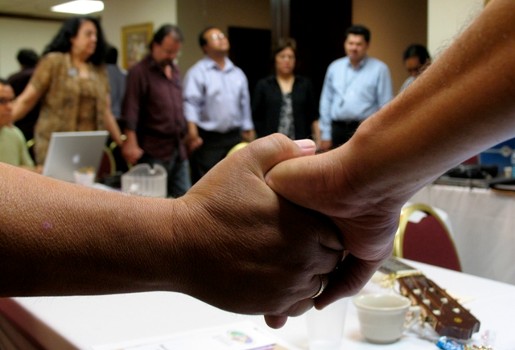A pastor views the current opioid crisis within the context of need for compassionate and loving relationships.
REV. DR. STEPHEN BAUMAN
United Methodist News Service
 I’ve been thinking about the opioid crisis. It’s awful. The statistics are overwhelming: opioids are the leading cause of death for Americans under 50 years old, killing roughly 64,000 people last year, more than guns or car accidents, and doing so at a pace faster than the H.I.V. epidemic did at its peak.
I’ve been thinking about the opioid crisis. It’s awful. The statistics are overwhelming: opioids are the leading cause of death for Americans under 50 years old, killing roughly 64,000 people last year, more than guns or car accidents, and doing so at a pace faster than the H.I.V. epidemic did at its peak.
It’s an especially acute problem in rural America, and in this way differs from the crack cocaine scourge from the 80’s and 90’s. The majority national opinion at the time considered crack a matter of law and order in the inner city, and we wound up imprisoning African Americans at an alarming rate. It should not escape our notice that this current affliction started as a rural white problem that has been addressed very differently. Compassionate restraint has replaced lock ‘em up.
We should also notice that today’s epidemic corresponds with a devaluation of historic pillars of American culture like churches and civic involvements that share an affinity for communal values supporting the common good. Today everyone is electronically fully connected except to things that really matter, things that nurture our souls and bind us together with love and compassion.
Years ago when learning about addictive behaviors, one of my mentors referred to alcoholism as a spiritual disease—behavior attempting to fill an emptiness at the center of a person’s core. While that doesn’t exhaust the topic, it still points to an important aspect of our current crisis. Something crucial is draining out of our culture and the resultant void needs to be filled.
When persons seek to get “clean”, in the words of AA’s first step, they admit they were powerless over alcohol, that their lives had become unmanageable, and came to believe that a Power greater than themselves could restore them to sanity. Over the years I have learned that many things could be inserted for the word alcohol, including money, sex, drugs (social media?), well, nearly anything that held one captive to behaviors that diminished their human dignity and capacity for compassionate and loving relationships.
Recently I was reminded of a speech Martin Luther King gave eight months before his assassination entitled, “Where Do We Go from Here: Chaos or Community?” Largely a cri de coeur for major renovation of the social fabric—laced as always with biblical allusions—much still rings with timeless potency:
“One night a juror came to Jesus and he wanted to know what he could do to be saved. Jesus didn’t get bogged down on the kind of isolated approach of what you shouldn’t do. Jesus didn’t say, ‘Now Nicodemus, you must stop lying.’ He didn’t say, ‘Nicodemus, now you must not commit adultery.’ He didn’t say, ‘Now Nicodemus, you must stop cheating if you are doing that.’ He didn’t say, ‘Nicodemus, you must stop drinking liquor if you are doing that excessively.’ He said something altogether different, because Jesus realized something basic: that if a man will lie, he will steal. And if a man will steal, he will kill. So instead of just getting bogged down on one thing, Jesus looked at him and said, ‘Nicodemus, you must be born again.’
King meant the whole nation required redemption, that is, a new way of understanding and organizing itself, with ramifications for individuals and the whole body politic.
I’m thinking that sounds about right for our moment as well…
Note: Rev. Dr. Stephen Bauman is the Senior Minister at Christ Church United Methodist in New York, NY.
Last Updated on October 31, 2017

